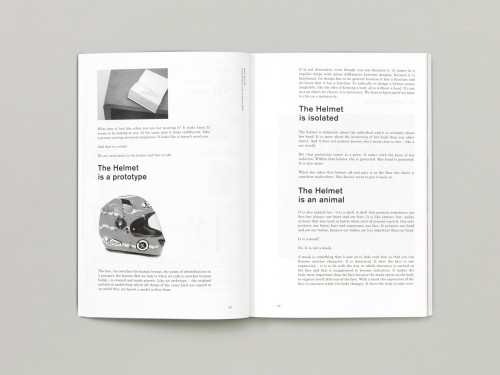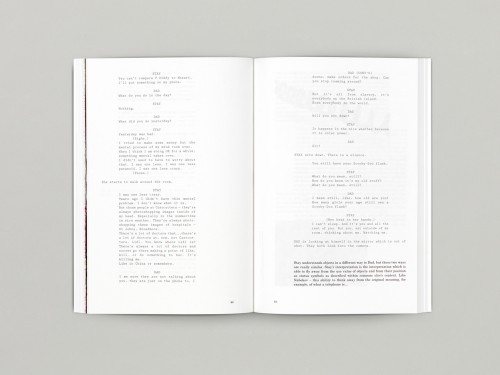User:Inge Hoonte/We are behind: Difference between revisions
Inge Hoonte (talk | contribs) (Created page with "==We are behind, a book in three sections== [http://apracticeforeverydaylife.com/book-works/emily-wardill-and-ian-white-we-are-behind/ More images] Presented as the blueprints f...") |
Inge Hoonte (talk | contribs) No edit summary |
||
| (One intermediate revision by the same user not shown) | |||
| Line 1: | Line 1: | ||
Emily Ward and Ian White, We are behind, Book Works, 2011. Designed by A Practice for Everyday Life. | |||
Presented as the blueprints for three public lectures, We are behind, a new artist's book by Emily Wardill and Ian White, proposes alternative routes through Wardill's work and represents three different attempts at embodying and dissembling knowledge. Using different formal textual devices, from which they also deviate—a standard lecture, the subject of which becomes something felt, not taught; an a-chronological conversation; and the transcript of a play rendered as a formal essay—each section describes the different facets of an ongoing dialogue between the authors. Fragmented not only by dialogic turns, appropriated texts, images, a score and quotations, and containing extensive reproductions of Wardill's work, the book's content and design reflects the labyrinthine, and sometimes hallucinogenic quality of her films and their radical combination of form, content and idea. | [[File:3_bookworks_we_are_behind_new.jpg]] [[File:5_bookworks_we_are_behind_new.jpg]] | ||
(Full quote from A Practice for Everyday Life website) Presented as the blueprints for three public lectures, We are behind, a new artist's book by Emily Wardill and Ian White, proposes alternative routes through Wardill's work and represents three different attempts at embodying and dissembling knowledge. Using different formal textual devices, from which they also deviate—a standard lecture, the subject of which becomes something felt, not taught; an a-chronological conversation; and the transcript of a play rendered as a formal essay—each section describes the different facets of an ongoing dialogue between the authors. Fragmented not only by dialogic turns, appropriated texts, images, a score and quotations, and containing extensive reproductions of Wardill's work, the book's content and design reflects the labyrinthine, and sometimes hallucinogenic quality of her films and their radical combination of form, content and idea. | |||
Each section focuses on specific works. Section One, The Object, uses The Diamond (Descartes Daughter), SEA OAK, and Game Keepers without Game, to explore ideas of the rational, public art, the public, linguistic framing and the irrational, via Gladys Knight and the Pips, a hand-drawn hallucinogenic section, Seth Price's essay Dispersion, Norman Mailer, The Rockridge Institute and Peter Gidal. Section Two, The Window follows a conversations between the authors, that opens onto desire, politics, mirrors, and the films Basking in what feels like 'An Ocean of Grace' I soon realise that I am not looking at it but rather, I AM it, recognising myself, Split the View in Two (Part Two), and Sick Serena and Dregs and Wreck and Wreck. In the final part, The Theatre, an apparently formal essay on the implications of framing live action, the proscenium arch as a link between theatre and cinema, Dan Graham, perspective, power and its collapse, transforms into a collection of dialogues around Ben, Sick Serena and Dregs and Wreck and Wreck, authenticity, reality and fiction. | Each section focuses on specific works. Section One, The Object, uses The Diamond (Descartes Daughter), SEA OAK, and Game Keepers without Game, to explore ideas of the rational, public art, the public, linguistic framing and the irrational, via Gladys Knight and the Pips, a hand-drawn hallucinogenic section, Seth Price's essay Dispersion, Norman Mailer, The Rockridge Institute and Peter Gidal. Section Two, The Window follows a conversations between the authors, that opens onto desire, politics, mirrors, and the films Basking in what feels like 'An Ocean of Grace' I soon realise that I am not looking at it but rather, I AM it, recognising myself, Split the View in Two (Part Two), and Sick Serena and Dregs and Wreck and Wreck. In the final part, The Theatre, an apparently formal essay on the implications of framing live action, the proscenium arch as a link between theatre and cinema, Dan Graham, perspective, power and its collapse, transforms into a collection of dialogues around Ben, Sick Serena and Dregs and Wreck and Wreck, authenticity, reality and fiction. | ||
Latest revision as of 14:41, 5 March 2012
Emily Ward and Ian White, We are behind, Book Works, 2011. Designed by A Practice for Everyday Life.
(Full quote from A Practice for Everyday Life website) Presented as the blueprints for three public lectures, We are behind, a new artist's book by Emily Wardill and Ian White, proposes alternative routes through Wardill's work and represents three different attempts at embodying and dissembling knowledge. Using different formal textual devices, from which they also deviate—a standard lecture, the subject of which becomes something felt, not taught; an a-chronological conversation; and the transcript of a play rendered as a formal essay—each section describes the different facets of an ongoing dialogue between the authors. Fragmented not only by dialogic turns, appropriated texts, images, a score and quotations, and containing extensive reproductions of Wardill's work, the book's content and design reflects the labyrinthine, and sometimes hallucinogenic quality of her films and their radical combination of form, content and idea.
Each section focuses on specific works. Section One, The Object, uses The Diamond (Descartes Daughter), SEA OAK, and Game Keepers without Game, to explore ideas of the rational, public art, the public, linguistic framing and the irrational, via Gladys Knight and the Pips, a hand-drawn hallucinogenic section, Seth Price's essay Dispersion, Norman Mailer, The Rockridge Institute and Peter Gidal. Section Two, The Window follows a conversations between the authors, that opens onto desire, politics, mirrors, and the films Basking in what feels like 'An Ocean of Grace' I soon realise that I am not looking at it but rather, I AM it, recognising myself, Split the View in Two (Part Two), and Sick Serena and Dregs and Wreck and Wreck. In the final part, The Theatre, an apparently formal essay on the implications of framing live action, the proscenium arch as a link between theatre and cinema, Dan Graham, perspective, power and its collapse, transforms into a collection of dialogues around Ben, Sick Serena and Dregs and Wreck and Wreck, authenticity, reality and fiction.
Emily Wardill is an artist who lives and works in London. A senior lecturer at Central Saint Martins College of Art she was recently awarded the 2010 Jarman Award. Ian White is an artist, curator and writer based in London and Berlin.
We are behind is co-published by Book Works, London, and de Appel, Amsterdam to accompany Emily Wardill's solo exhibition windows broken, break, broke together, curated by Ian White. Printed offset in an edition of 1,500 copies, colour and b/w, 160 pages with a soft cover. Designed by A Practice for Everyday Life, 160 x 230 mm.
Book Works is funded by Arts Council England and de Appel is supported by the Ministry of OC+W and the city of Amsterdam. This publication is generously supported by DeckersSnoeck and the Elephant Trust


